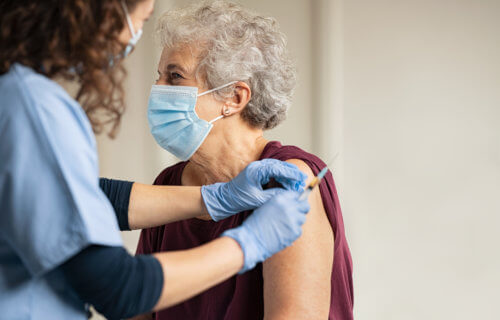GENEVA, Switzerland — COVID-19 vaccinations have continued to keep the pandemic in check, even as new strains like the Delta variant pop up. Although some health officials have suggested that the vaccinated public may need a booster shot in the coming months, a new paper published in The Lancet finds that may not be the case. Researchers, including members of the World Health Organization and the U.S. Food and Drug Administration, say COVID vaccines are still highly effective against the virus and its variants. They conclude that, right now, it’s more important to get more people vaccinated than give vaccinated people an extra shot.
The authors examined data from the most recent controlled trials and other observations during the vaccine rollout during their review. Those findings reveal that coronavirus vaccines continue to have a 95-percent efficacy; preventing severe cases of COVID-19 from both the Alpha variant and the new Delta strain. The COVID vaccines also continue to show an 80-percent success rate at preventing any level of infection from the virus.
Top priority: get more people their first shot
The paper concludes that even though the vaccine is less effective at preventing mild, asymptomatic cases of COVID, the main drivers of the virus’s spread continue to be unvaccinated individuals carrying COVID-19. With that in mind, the authors say spreading out the current supply of COVID shots among people who still need them is a bigger priority since vaccinated individuals already have good levels of protection.
“Taken as a whole, the currently available studies do not provide credible evidence of substantially declining protection against severe disease, which is the primary goal of vaccination. The limited supply of these vaccines will save the most lives if made available to people who are at appreciable risk of serious disease and have not yet received any vaccine. Even if some gain can ultimately be obtained from boosting, it will not outweigh the benefits of providing initial protection to the unvaccinated. If vaccines are deployed where they would do the most good, they could hasten the end of the pandemic by inhibiting further evolution of variants,” says lead author and WHO member Dr. Ana-Maria Henao-Restrepo in a media release.
The team adds that even if the COVID vaccines lose potency over time, having more people vaccinated makes that less of an issue. Moreover, researchers say as vaccines lose effectiveness, human antibody responses may actually make up the difference. Although vaccines can have a relatively short lifespan in patients, the human body also relies on antibody memory responses to help fight off future infections. Simply put, the body remembers when it gets sick and prepares for future encounters with that virus.
Who may need booster shots in the future?
The authors note that if the public needs COVID booster shots in the future, it will be important to first identify who would benefit the most from another shot. Previous studies have pointed to older adults and those with compromised immune systems as likely candidates for a second or third shot, depending on which brand they receive.
Researchers add that if another COVID variant appears, it would be smarter to create a booster which specifically targets that variant — instead of using the current COVID vaccines which may be less effective. That process would be similar to how scientists deal with the annual flu vaccine, tailoring it to deal with that year’s most prevalent strains.
“The vaccines that are currently available are safe, effective, and save lives. Although the idea of further reducing the number of COVID-19 cases by enhancing immunity in vaccinated people is appealing, any decision to do so should be evidence-based and consider the benefits and risks for individuals and society. These high-stakes decisions should be based on robust evidence and international scientific discussion,” concludes co-author and WHO Chief Scientist Dr. Soumya Swaminathan.
The review appears in The Lancet.
